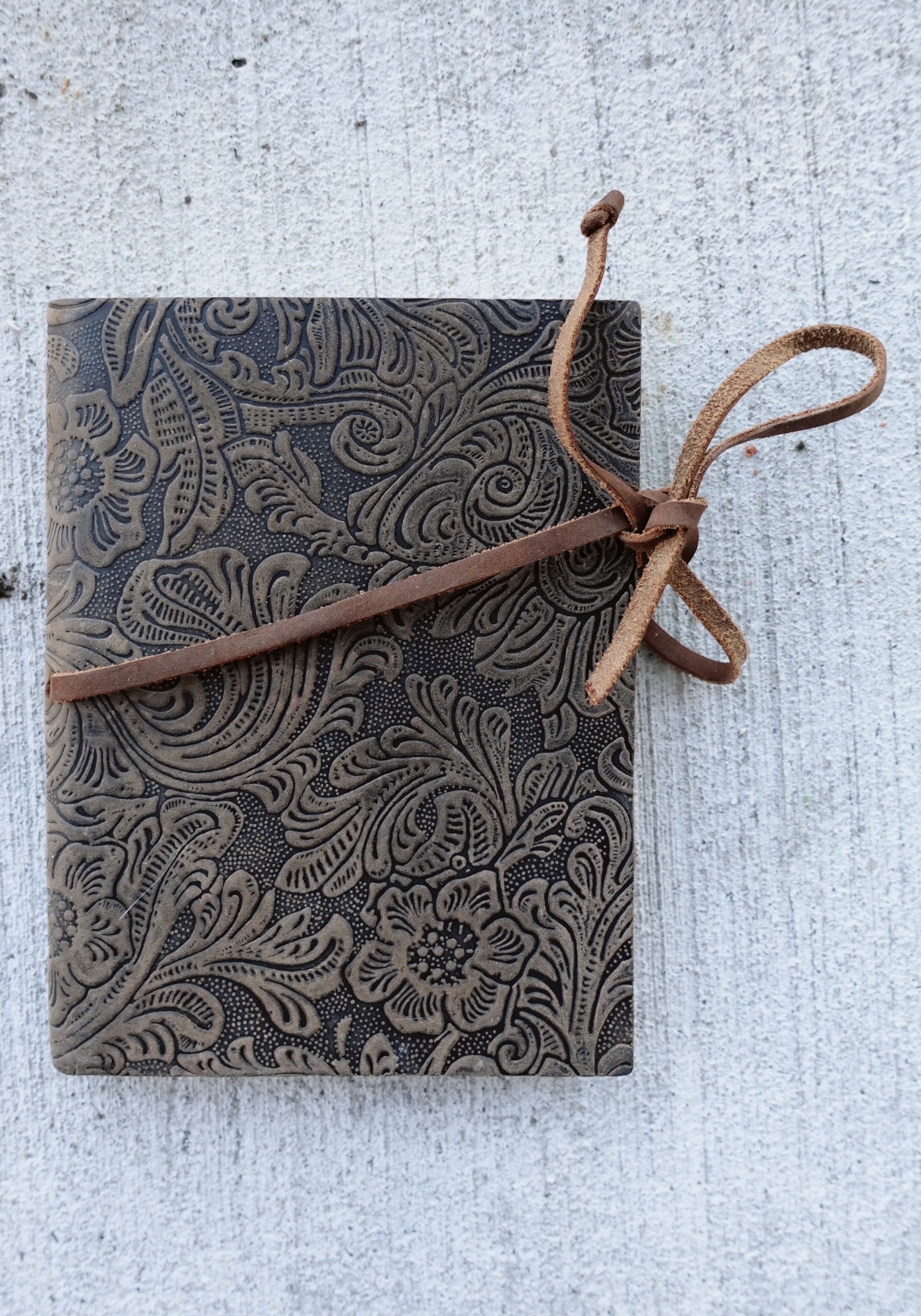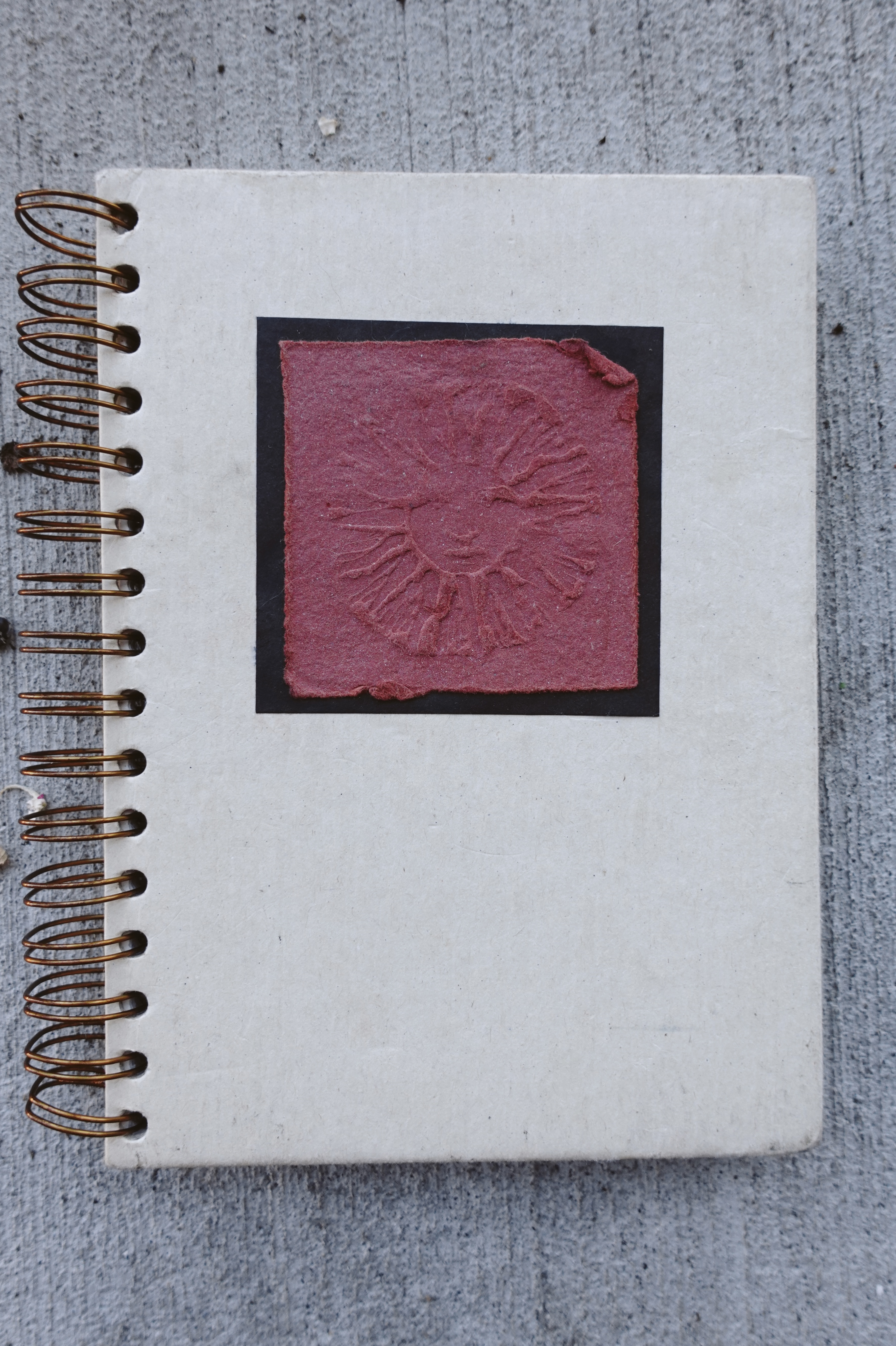Many people want to start a journal, but don’t know where to start. What do you write about? How do you write? How do you work through writers block?
This article will help you ease these concerns and learn how to write with flow and be eager to log your thoughts and ideas.
Find A Journal That Feels Good To You
Perhaps the most exciting part of starting a journal is going out and finding one.
When I first began to journal, I would purchase notebooks from stores like Target. My most recent journal was a gift from my sister, which she purchased second hand at a thrift store. Even though she bought the journal for herself, after I commented on it’s uniqueness she decided to give it to me as a gift for my birthday.
I fell in love with the individuality of the journal. There is no branding on it. Visually the journal is aesthetically pleasing and feels like a comforting place to write and connect to creative energy.
I suggest savoring the experience of finding yourself a new journal. You can find unique journals in a number of places, like: the craft section of a second hand thrift store, an antique store, a small business gift shop or even on Etsy. Recently I’ve enjoyed buying journals while on vacation or exploring new cities. This way, you can have a positive memory associated with your journal.

Journal 2
a journal I bought because It’s unique texture and pattern.
Journal 1
the journal my sister gifted me.

Create An Intention With Your Journal
To begin a journal, it is important to create an intention. Why has starting a journal called to you? What are you aiming to gain or learn?
Many people feel a sense of obligation to journal daily. The truth is that their is no one right way to do anything, and this applies to journaling. As time goes on, you will develop your own unique style. You’ll detach from the idea that it needs to be a daily thing. You will be guided by your intuition on when to journal.
You’ll grow your own relationship with it and find joy in opening up your journal when it feels right. Soon enough, it will become a non-negotiable when it comes to working through your thoughts.
Intentions don’t mean commitments. Let your intention be what you’ll gain, not how often you will journal. Once you have your intention, write it on the first page of your journal. It will act as a reminder for your writing process. Here are some examples of intentions you may make:
- Connect to something greater than myself (source, God, the divine)
- Find clarity and insight
- Hold space for each and every emotion
- Embrace the human experience
- Feel at peace
Write Like A Witness
I began to journal when I was 15 years old. I had journals before that time as well, but they were never complete or thorough. Now in my early twenties, I have noticed one major difference in my writing style.
Within the last two years, I have practiced writing like a witness. Rather than reciting the events of what I am going through, I explain the emotions I experience from a third person point of view. This approach to writing allows for a more ‘subjective’ unpacking of your thoughts, which creates less of a feeling of ‘ownership’ over them.
This approach is not intended to suppress emotions or thoughts. It prompts self-compassion. You will find yourself actively validating your emotions as you think them through on paper. Rather than reciting things as they are, you are essentially comforting yourself by acknowledging what thoughts have manifested. Write like a wise witness. Imagine that the words coming through to you are insights from someone outside of you that intends to validate and support you.
Speak From a Third Person Point of View
You can tell if you’re writing as a witness if you don’t use personal pronouns. My journal entries from when I was younger included ‘I’ or ‘me’ in almost every sentence. When focusing on our subjective reality, it is much more difficult to problem solve. If you have gone through something difficult or find yourself bombarded by negative thinking, reciting them only increases your sense of identity with those emotions.
When writing, if I use ‘I’ or ‘me’ I leave it until the end of an entry. This way its easier to connect the wisdom you have just gained to your own personal experience.
I also actively incorporate ‘you’ or ‘people’ or ‘we’ during my entries, to encourage insight. This helps you recognize that what you feel can be experienced collectively. You will be absolutely astonished at how incredibly wise you are through this. You will realize that even though it doesn’t seem like it, you almost always have the answers you are looking for.
Be fluid in your writing process. When you feel like it, feel free to write in first person. There’s no correct way to journal.
Don’t Be A Perfectionist
The most organic writing comes from us when we aren’t worried about sounding like published authors. You’ll find yourself in flow when you can scribble out ideas without worrying about the sloppiness of your handwriting.
Treat ideas or thoughts that come to you with respect. Don’t try and restrict them by making them look perfect. If they want to come out sloppy and illegible, let them. If there’s incorrect grammar, let it be incorrect. Prioritize the expression of thoughts over making your journal look aesthetic. Honestly, I find that the most satisfying journals are wrecked, unorganized, and often don’t make sense to anyone who didn’t write it. It makes your writing look and feel more real.
Perfectionism also applies to organization. I used to organize my journals in categories. For example, I had an affirmation category, a first person category, and a third person category. Soon enough I stopped caring and just wrote as I pleased. Sometimes I’ll even write ideas for topics I want to write about, or books I want to read.
Practicing letting go of perfectionism lets you fill up your journal faster than you can imagine. The journal my sister gave me is just about full, and I’ve had it for a little under 5 months. So, stop tearing out pages because your handwriting sucks or you sound illiterate.
Minimize your negativity
- Don’t ruminate on what’s going wrong
This is a space for healing. Minimizing your negativity doesn’t mean ignoring your negative attitudes. We all have negative attitudes. Learn the art of redirecting those negative attitudes. Reframe them. Be creative when describing how those negative attitudes feel physically and emotionally. Think of redirecting your attitudes like clay on a pottery wheel. When you start out, you have a solid material thats difficult to mold to your liking, until finally you add water and take time to apply pressure and smoothen out the clay as needed. With time, you have carefully taking time to pay close attention to the state of your emotions and have molded them into something completely new.
EXAMPLE: An entry from when wanted to control a situation I couldn’t control.
See yourself on the brink of slipping into unconscious living. Feel. Feel how hollow it is. Witness the tension in our body. Notice how little you see the beauty in the happenings around you. Notice how all the world feels dull and grey.
In this state of mind you shutter in panic and attempt to free yourself from the discomfort of it all. Maybe you numb yourself through your vices.
But what if you just took a moment? Take a small moment. The discomfort is coming from you trying to take control. But you can’t. You never can, and never will.
So relax. Find your calm. You can’t control people or things. You detach and begin to frown when the world isn’t seeming to go your way. But then you fall apart when you see the world and those in it less interested in you.
So open your heart- For the sake of your own well being and the well being of those around you.
2. Focus on yourself
My most recent journal is absent of any shit-talking. I don’t mention anyone in my journal entries unless its a positive thing- like feeling loved, seen, or cared for by someone in my life.
If someone does make me feel bad, I use the witness writing approach to deviate the attention away from them as I find that it doesn’t help me resolve how I feel internally.
When you focus on others, it makes it more difficult to find emotional freedom from the events taking place. You also find it easier to fixate on what others are doing, feeling, or saying and it heightens your need to control outside circumstances.
One of the most admirable traits a person can have is a sense of autonomy and self-regulation. Focus on yourself and watch yourself start to process conflict, misunderstandings, and confrontation quicker and with more ease.
3. Validate yourself as much as possible
Write with this in mind: what would I want to hear from someone whose opinion I trust? What would a person who is unaffected by what I feel say during this?
4. Write about whats going right!
People think healing just means working through difficult emotions. But, a crucial part of healing is being mindful of what is going right. Imagine the pressure to feel like your only way of feeling better is trying to change your circumstances. Sometimes our circumstances are actually pretty good. Put just as much care and attention into what It’s like to feel good as you do trying to make yourself feel better.
Often times, we witness our loved ones focus on what is going wrong in the world. Not many people are born into families that urge you to recognize the positive things that are taking place. This can be something as simple as witnessing the stillness of a lake, hearing the sound of birds in the morning, or seeing someone be happy.
Write about little moments of peace and recognize that feeling good doesn’t have to mean achieving something extraordinary. Hold this idea in your awareness throughout your day and write little entries about simple positive things. Overtime you’ll have these ideas in your thoughts as you are out and about in the world.
Write small entires about these positive things. Keeping them shorter makes it easier not to create a sense of false optimism or gratitude.
Brandy Maria